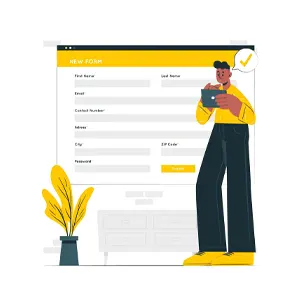If you’ve started a new business or are planning to, then getting Startup India Recognition is one of the smartest steps you can take to enjoy various tax benefits, government schemes, and funding opportunities. The Government of India, through the Department for Promotion of Industry and Internal Trade (DPIIT), launched the Startup India initiative to encourage innovation, create employment, and make it easier for startups to grow in India. However, the process of getting recognized as a startup by DPIIT can be a bit confusing, especially if you're doing it for the first time.
That’s where CallmyCA comes in. We help early-stage entrepreneurs, founders, and small businesses apply for Startup India Recognition online, with complete guidance, document support, and end-to-end processing. Whether you're a Private Limited Company, LLP, or Registered Partnership Firm, we make sure your business meets the eligibility requirements and gets recognized quickly without mistakes or rejections.
Getting this recognition not only gives you a special identity as a government-acknowledged startup, but it also opens the door to income tax exemption under Section 80-IAC, angel tax exemption under Section 56(2)(viib), faster patent registrations with 80% rebate, easier public procurement, self-certification under labor and environmental laws, and more. Most importantly, it builds credibility for your startup in front of investors and government agencies.












Startups can apply for a 3-year tax holiday in the first 10 years, allowing them to reinvest profits back into the business.
Recognized startups are exempt from angel tax, which helps in raising funds from investors without tax complications.
You can apply for various public procurement tenders even without prior experience or turnover limits, giving you access to big opportunities.
Startups get up to 80% rebate on patent fees and quicker examination under IP facilitation support.
Only recognized startups can participate in government-backed funding programs, pitch sessions, and incubator/accelerator grants.
If things don’t work out, a recognized startup can be shut down within 90 days through a fast-track exit mode.
DPIIT-recognized start-ups get featured in global summits, industry meets, and start-up exchange programs for better reach.
If things don’t work out, recognized start-ups enjoy easier exit policies within 90 days under the Insolvency & Bankruptcy Code.
Recognition builds credibility and trust among investors, banks, and customers, as it's seen as a government-verified start-up
To be eligible for Start Up India Recognition, the business must be registered as a Private Limited Company, LLP, or Partnership Firm. It should be less than 10 years old from the date of incorporation and have an annual turnover not exceeding ?100 crore in any financial year. The startup must be working towards innovation, development, or improvement of products or services, or have a scalable business model with high potential for employment or wealth creation. Startups formed by splitting or reconstructing an existing business are not eligible. Recognition is provided by DPIIT under the Start-up India Scheme.
When your business is registered under Start Up India, you get many benefits from the government. You can save tax for 3 years, raise money from investors without paying extra tax (angel tax), and apply for government tenders easily even if you are a new company. You also get discounts on patent and trademark fees and your applications are processed faster. If someday you want to close the business, the government helps you do that quickly without many problems. It also becomes easier to get into startup events and funding programs. Overall, it helps your startup grow faster and saves time, money, and legal work.
Normally, it takes around 10 to 20 working days to get your Start Up India Recognition certificate after you apply. But this time can change depending on how good your documents are and how fast the government team (DPIIT) checks your application. If your papers are complete and correct, it gets approved faster. But if there are any mistakes or missing things, it may take longer or even get rejected. That’s why it's better to take expert help like CallMyCA. We make sure everything is perfect before submitting, and we also follow up with the department regularly to speed up the approval process.
Yes, even if your startup is not making any money yet or doesn't have any profits, you can still apply for Start Up India Recognition. The government is mainly looking at your business idea — it should be new, useful, and have the potential to grow in the future. Many startups are at the idea stage or have just started, so they don’t have income or customers yet. That’s okay. What matters is that your idea should solve a real problem or improve something that already exists. You will need to submit a small write-up or summary about your idea, and if it's good, your application can get approved even without any income.
Yes, you can apply even if your startup is not making money or profit yet. The government doesn’t say that you must be earning to get Start Up India Recognition. What matters more is your idea. If your idea is new, helpful to people, and has the power to grow in the future, then you can apply. Many startups are new and take time to earn money, so it's normal. Just make sure your idea is clear and solves a real problem. You also need to explain your idea in simple words while applying, so the officials can understand and approve it.
No, having a website is not compulsory for Start Up India Recognition. But if you do have a website, it is a good thing. It helps the government people understand your business better. If you don’t have a website, you can also give your business’s Instagram, Facebook, LinkedIn or any other page where your business is active. This shows that your startup is real and doing something. If you are just starting and don’t have any online page, then it’s okay too — just make sure your business idea is explained properly in the write-up you submit with the application
Yes, Start Up India Recognition is a one-time process. Once your startup is approved and gets the recognition certificate from DPIIT, you don’t have to apply again every year. It stays valid as long as your startup follows the rules – like your company should be less than 10 years old and your turnover should not cross ?100 crore in any year. If your business grows and goes beyond the limit, then you won’t be counted as a startup anymore, but until then, you don’t need to renew or reapply. So it’s a simple process — apply once and use the benefits for years.
No, you cannot get income tax exemption automatically after getting Start Up India Recognition. Once you get the recognition certificate from DPIIT, you have to apply separately for income tax exemption under Section 80 IAC. This is a different form and goes to the Income Tax Department for approval. You also need to meet some extra conditions, like your startup should be a Private Limited Company or LLP, and it must not be formed by splitting an existing business. Don’t worry — if you choose CallMyCA, we will guide you step-by-step and help you apply for tax exemption too, once your recognition is approved.
If your Start Up India Recognition application gets rejected, don’t worry. First, we check the reason why it was rejected. Sometimes the problem is with documents, business idea explanation, or missing details. Once we know the reason, we fix the issue and then reapply. Many times, applications are approved on the second try if the mistakes are corrected properly. With CallMyCA, you don’t need to stress — our experts will carefully go through everything, make the needed changes, and file the application again to make sure your startup gets recognized as soon as possible.
Yes, once your application is approved, you will get an official Start Up India Recognition Certificate from DPIIT. This certificate is sent to you in a digital (PDF) format and is proof that your startup is officially recognized by the Government of India. You can use this certificate to apply for tax exemptions, take part in startup events, apply for government tenders, or show it to investors and banks. It builds trust and adds value to your business. The certificate contains your startup’s name, date of recognition, and other details that make it easy to show you're a genuine startup